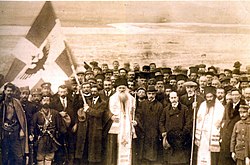Balkan Wars 1912-1913
Balkan Wars (1912–13)
With the outbreak of the First Balkan War (1912–13) and the Ottoman defeat, the Greek army entered the region. The outcome of the following Peace Treaties of London[i] and of Bucharest,[j] signed at the end of the Second Balkan War, was unpopular among both Greeks and Albanians, as settlements of the two people existed on both sides of the border: the southern part of Epirus was ceded to Greece, while Northern Epirus, already under the control of the Greek army, was awarded to the newly found Albanian State. However, due to the late emergence and fluidity of Albanian national identity and an absence of religious Albanian institutions, loyalty in Northern Epirus especially amongst the Orthodox to potential Albanian rule headed by (Albanian) Muslim leaders was not guaranteed.[k]
Autonomous Republic of Northern Epirus (1914)
In accordance with the wishes of the local Greek population, the Autonomous Republic of Northern Epirus, centered in Gjirokastër on account of the latter’s large Greek population,[36] was declared in March 1914 by the pro-Greek party, which was in power in southern Albania at that time.[37] Georgios Christakis-Zografos, a distinguished Greek politician from Lunxhëri, took the initiative and became the head of the Republic.[37] Fighting broke out in Northern Epirus between Greek irregulars and Muslim Albanians who opposed the Northern Epirot movement.[l] In May, autonomy was confirmed with the Protocol of Corfu, signed by Albanian and Northern Epirote representatives and approved by the Great Powers. The signing of the Protocol ensured that the region would have its own administration, recognized the rights of the local Greeks and provided self-government under nominal Albanian sovereignty.[37]
However, the agreement was never fully implemented, because when World War I broke out in July, Albania collapsed. Although short-lived,[37][m] the Autonomous Republic of Northern Epirus left behind a substantial historical record, such as its own postage stamps.
Source : Wikipedia

